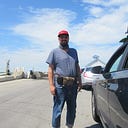Perspectives: Finding City Nature with Amanda Lukas Part I
PLEASE NOTE: THERE IS ACCOMPANYING AUDIO TO THIS BLOG. TO HEAR THE AUDIO SELECTION PLEASE VISIT WWW.FORESTSHEFA.COM
Many times our perspective of nature fits into a neat psychological box that contains natural landscapes, wildlife, blooming seasons and is conveniently removed for our next hike or camping trip. I went searching for something wild in the city center and there I found Amanda Lukas, sustainability manager at Findlay Market in Cincinnati, Ohio, USA. Amanda is doing amazing work there with a gleaning program that transforms unsold produce from market days into quality meals for the less fortunate of us. Whatever food waste is left over goes to an urban compost program that produces tons of ready to use compost. Amanda was kind enough to devote a part of her day to give me a tour and sit down with me for an interview of her perspectives on multi-use in public spaces and transitional spaces, personal experiences of hers in nature, what spending a few hours in nature can do for mental health and many more intriguing and engaging topics.
Amanda was born in urban South Philadelphia, where her only encounter with nature was city planted trees that had to be replaced every few years because of the contaminated soil. Soon after though, she moved to New Jersey where she discovered the beaches of the Jersey shore. This was her first true encounter with natural landscapes.
She describes being at the beach with her parents and collecting shells. The general notion of exploration and connecting with a place based on its simple beauty that fits in with a child’s view of wonder of the world. This is a connecting element that continues throughout a lifetime.
After a move to Kentucky in her formative years, she discovered the wilds of a forest. As compared to the urban and suburban settings of the East, when she arrived in Kentucky, she had exposure to a different sort of wild. The lushness of an unbridled landscape. The epitome of this landscape is Red River Gorge. A result of erosion and a landscape within a landscape, Red River Gorge is a climber’s haven and a hiker’s delight.
When I asked Amanda about her most comfortable experience in nature, the setting was also Red River Gorge. She told me about a week trip there with the loyal company of her dog to clear her head and reset. Amanda talks about this experience as she slowly throughout the week made her way into a mindset that was synchronized with her immediate environment and to nature. We talked about it is almost as though there is a recalibration of brain waves during a trip like this where all you see and experience around you is the natural world and its wonders.
This question of a story about when she felt embraced by nature quite naturally provoked the polar opposite story of discomfort and she tells in this next piece of the interview. She tells about how she went out to Yellowstone, went out on a solo hike and got turned around. She was able to call the rangers who came to locate her based on her descriptions to the rangers. Suddenly, finding yourself lost in a magnificent wilderness is a humbling experience that reminds us of our fragility and our dependence on the great wide web of humanity and civilization’s (sometimes hollow) promise to search and save anyone who needs the help (whether they want it or not). Here is the clip with her storytelling of her experience:
As our conversation progressed, the market started to come alive with the cacophony of vendors, clients and residents. This lead our conversation to green spaces in urban environments and the affects on individual and public health. Although there was an acknowledgment that not everyone experiences nature in the same way, Amanda proposed a variety of spaces suited to meet the needs of occupants of the space:
These green space are multi-purpose but Amanda’s points and my interest direct my attention to the encounters with nature that these green spaces provide. Any encounter that inspires awe and appreciation from an amazing city and landscape view to taking a moment to sit under and tree and take a closer look at the plants and animals that inhabit where you have sat yourself down. Again the topic of this type of connection to your surroundings and how it affects physical and mental health arose. To the both of us sitting in this conversation, it was entirely evident that anyone who seeks out nature whether in pockets or in swaths will find a little more of themselves and learn some lesson that nature happily provides.
Check out upcoming Part II to hear our conversations on transitional ecological zones, a nice piece of humble pie and of course the must do’s when visiting Findlay Market.
